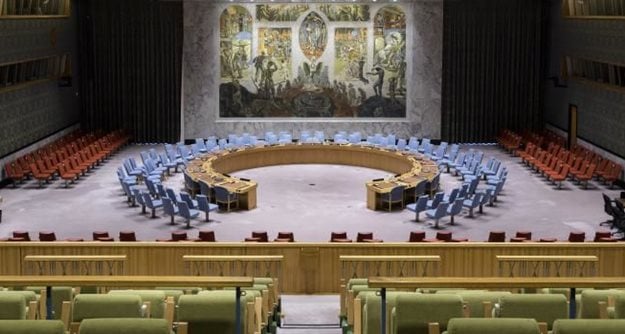
The UN Security Council has yet to hold a meeting on coronavirus. Image source:
UNThat’s the dilemma facing China and South Korea right now. Both countries appear to have halted or slowed the internal spread of the new coronavirus and are beginning to worry about contaminated travelers from abroad setting off a new outbreak – including by their own citizens returning home.
In other words, as long as the virus is present in any country, it can reenter those that have managed to slow it down – or even ones that eventually eradicate it.
As an economist, I worry that efforts to prevent a second wave of contagion will prompt countries to put up more borders to international travel and trade. This would compound and prolong the adverse economic impact.
That’s why I believe the only effective long-term solution against the coronavirus is a global solution – which requires a coordinated response.
An uncoordinated mess
Dozens of countries are taking a variety of strong measures to fight the spread of the new coronavirus, from social distancing and mass quarantines to severe restrictions on the movement of people and goods.
But there’s been little or no coordination, the timing has varied considerably and the piecemeal manner in which restrictions have been put in place demonstrates that lessons are not being shared, which has made it harder to defeat the virus. Moreover, the lack of coordination among countries when imposing travel bans has led to diplomatic tensions that will only make matters worse, such as when the Trump administration banned flights from Europe without consulting longstanding allies.
Even in the hunt for a vaccine there is a clear lack of international coordination, which can speed up the process. Furthermore, most countries seem to be adopting a nationalistic rather than a collaborative approach that could limit a potential vaccine’s effectiveness in ending the pandemic, with the possibility that each country will favor its own citizens over others.
While these efforts are slowing the spread of the coronavirus in some places, it continues to worsen in others such as the U.S., Europe and Iran, which demonstrate that they are not enough to eradicate the threat completely. And that means successful countries will have to impose or continue severe and costly constraints on international travel – and those that have managed to avoid an outbreak, such as Russia, must continue to keep their restrictions in place. In Russia’s case, closing border crossings to China has severely hurt trade as well.
If a large number of countries impose such restrictions simultaneously, everyone suffers, adding to the already high economic costs of the coronavirus with no end in sight.
Working together
Right now, I believe the world needs to coordinate in three key ways:
- Agree on a two-week global lockdown across all countries, even those not severely affected by Covid-19. Several countries are currently imposing such mass quarantines, with mixed success. A global, synchronized lockdown would be more effective.
- The World Health Organization should lead global efforts to find an effective vaccine and treatments for Covid-19, ensuring they are widely available. The group could help disseminate research findings quickly and coordinate activities to avoid duplication. Consequently this would reduce the amount of time it takes to find a pharmaceutical solution.
- Restrictions on international travel and trade should be implemented in cooperation with other countries. Rather than nationalistic restrictions that benefit one country at the expense of others, the cost of the needed restrictions could be distributed among all trade partners in a fair manner that motivates all governments to participate in these painful economic measures.
Global coordination has worked well in past crises like this one. For example, in 2014, President Barack Obama took the lead in the global fight against the Ebola virus, which affected several countries in Africa. American leadership played a crucial role in mobilizing and coordinating the global fight that ultimately contained the epidemic.
That’s the kind of leadership the world needs right now. Surprisingly, the strongest call for global coordination against Covid-19 has come from Saudi Arabia, which currently leads the Group of 20 largest economies, instead of the U.S., China or the European Union.
Although there’s been no commitment so far to attend this virtual meeting, I hope the political leaders of the world’s largest economies accept this invitation. A coordinated response to this pandemic cannot come too soon.
This article is republished from The Conversation under a Creative Commons license. Read the original article.















